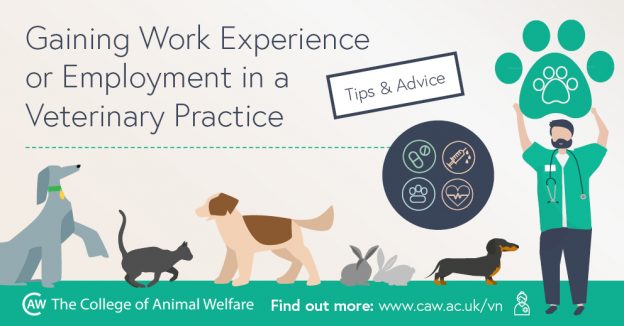If you’re interested in studying veterinary nursing with us, you may have noticed that due to the work-based nature of the course, entry onto our Level 3 Diploma in Veterinary Nursing (Small Animal Pathway) programme requires you to either;
- have completed a minimum of two weeks’ work experience in a veterinary environment within the last 12 months (non-employed students), or;
- have secured employment within an RCVS approved TP or aTP that is willing to support you through the qualification (employed students)
Veterinary nursing is a popular profession and entry onto our training programmes is often very competitive, therefore work experience opportunities for aspiring student veterinary nurses can sometimes be hard to come by…
If you’re struggling to gain the experience needed to apply for the course, don’t give up! Take a look at our tips and advice about how to gain work experience in a veterinary practice:
Check local newspapers and online job boards
Job boards such as the CAW jobs board, Vet Times Jobs or Animal Jobs Direct list advertisements from veterinary practices for veterinary care assistants (undertaking the VCA course could be an alternative way for you to qualify for veterinary nurse training), animal nursing assistants or student veterinary nurses (SVNs)
Follow local veterinary colleges and veterinary practices on social media
Many training providers and veterinary practices will post their latest vacancies for student veterinary nurses on their social media pages, so it’s worth following those pages to ensure you are the first to see any new opportunities. You can follow us on social media here: [ss_social_follow networks=”facebook;twitter;instagram;pinterest”]
Check out your local veterinary practices’ websites
Many practices have their own vacancy page or further information about placement opportunities on their website, which can help you learn more about what they’re looking for. This way, you’ll also read more about who the practice is and what they do. Find a veterinary practice near you
Contact your local veterinary practices directly
By contacting practices to introduce yourself and enquire about work placements/employment directly, you are putting a face to your name and showing commitment and enthusiasm! You can drop them an email, give them a call or even stop by the practice to meet staff members in person. Even if they are unable to offer you a placement at that moment, they may be able to hold your details ready for future opportunities, or introduce you to other members of the profession who can help you gain a placement. Find a veterinary practice near you
Be aware that veterinary practices are often very busy, so don’t be disheartened if you aren’t able to speak to someone straight away. Practices are particularly busy at peak times such as Mondays and Fridays, so it’s worth trying to contact them mid-week.
Get more advice about gaining work experience in a veterinary practice…

